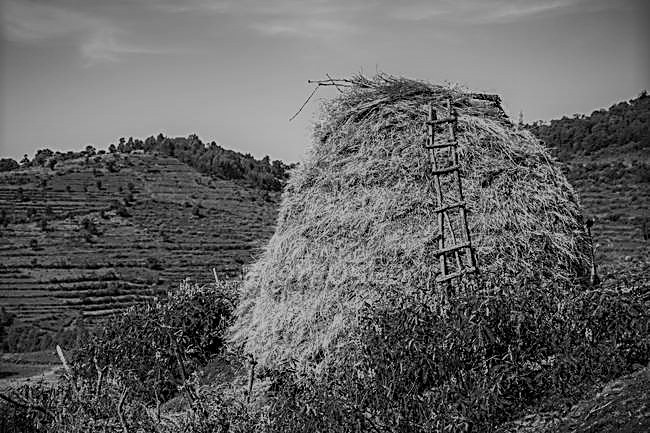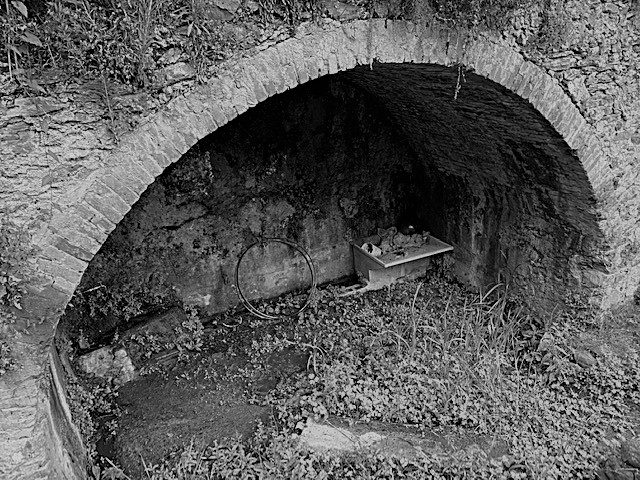November, 1944. A farm outside the village of Bassone in Tuscany. These are the final months of World War II and Italy is imploding.

Rina peeked out of her bedroom window into the field behind the house. Two Nazi soldiers were circling the haystack in the autumn mist. The senior of the men raised his fist and extended his fingers, one, two, and on three, they lunged their bayonnets into the hay.
Rina’s hands began to shake and the past two months flashed before her eyes. She remembered the first time she saw the back of Vincenzo’s head while he asked her father Tommaso for shelter from the fascists and Nazis. His black curls were splattered with dust.
“I come from Sicily. I am a partisan and I am fighting for Italians like you, people who tend the land,” he said.
Tommaso looked him up and down. Vincenzo stretched out his hands.
“I know it is a lot to ask, but I only need shelter during the day. We carry out our tasks against the enemy after dusk.”
“We will help you as long as we can,” Tommaso replied, then nodded in her direction.
“This is my daughter Rina. She will get you some water to wash.”
Rina watched Vincenzo turn and pull off his hat. His face was slick with grime but his eyes were clear. They reminded her of the stones on the amber necklace that her mother gave her before she died and she was not afraid.
The Nazis found no body in the hay, but Rina held her breath. If they set the haystack on fire, Vincenzo would die from the smoke when it filled the hole underneath where he was hiding. The Germans sauntered towards the house and she exhaled. They could ransack every room as long as he was safe.
Rina never minded getting up at five to brew the chicory and slice the bread from yesterday’s evening. Tommaso wanted Vincenzo fed and back in his hiding place before sunrise. She enjoyed lingering at the barn door to watch him bring the steaming bowl to his lips.
“If we had coffee and sugar, we would share it with you,” she would say and touch her hair.
“Both you and your father are too kind to me,” he would mutter, then lower his eyes and think of the corpse of a child rotting in the bushes on the road to Campania. Anything to distract himself from the curve of her calves branching out of her clogs.
“Tommaso might be a partisan, but one false move with this beauty and he will send me packing,” he thought to himself.
Indeed, if Vincenzo or any Italian male of military age were discovered out in the open without a fascist uniform, he would be shot for treason.
Rina stood in front of the stove, boiling nettles and potatoes. The soldiers had taken the pancetta, all the eggs, the bread and a cask of oil. So far, none of the Nazis who raided the house ever thought to dig into the plaster of the walls, where Tommaso had stored hundreds of wine bottles full of flour and polenta. This would be a meagre meal, but at least the bastards were gone and none the wiser.
Tommaso sat at the table behind her rolling tobacco with unsteady hands.
“If they had found him, I dread to think what would’ve happened to us.”
Rina continued to stir the soup. “But they didn’t. He is well hidden.”
“I’m also to blame. I’ve been giving him grain to pour into the enemy’s fuel tanks at night.”
Rina dug her hands deep into her apron and turned around.
“Please don’t send him away, Papa.”
Tommaso studied his daughter’s face. She looked just like her mother Angela when something was important to her. Vincenzo was a decent fellow, but he would most likely return to Sicily after the war ended and she would be left with a broken heart.
“When we are out of this mess, Eduardo will return to the village for good.”
Rina sniffed in disdain. “Eduardo? You would have me marry a Black Shirt fascist?”
“He went to war because it was his duty. Law-abiding men make better husbands than characters like Vincenzo and me.”
Rina salted the soup, annoyed. “I have never felt anything for Eduardo. He’s just a friend.”
“What I’m saying is that we don’t know Vincenzo’s plans…”
Rina slammed the spoon down on the counter. “No one has plans. We just live from hand to mouth every day.”
Tommaso sighed. Vincenzo would have to stay. A light went out for both of them when their Angela had died at the beginning of the war, but Rina’s world grew even darker when the local school had closed and her dream to become a schoolteacher was ground to dust. He could not close another door in her face. However, both of them would need to be watched closer.
At dusk, Rina pushed a pole through a hole at the bottom of the haystack and jiggled it left to right. The stick went rigid in her hand and she smiled. She tried to pull it towards her but Vincenzo’s grasp was tighter. This was her favorite moment of the day, when her fingers parted the hay and reached Vincenzo’s. Their hands would entwine and linger while they pretended that Rina needed to pull him out of his cocoon.
Rina watched Vincenzo eat his soup in the barn. She felt ashamed to be feeding him such slop, but he was so hungry he slurped it down.
“So you heard nothing this afternoon?” she asked.
Vincenzo looked up at her, curious.
“They left no stone unturned except one,” she said with a little laugh.
Vincenzo put down his bowl, worried. “I should find another place to stay. This isn’t fair to you anymore.”
Before she could protest, her father entered the barn carrying a coil of metal wire and dropped it at Vincenzo’s feet.
“Your job is not done here. Tonight, the Nazis will be riding in sidecars along the road to Pontremoli.”
Vincenzo nodded at Tommaso, grateful. If he pulled the wire taught across the road, any sidecar would turn over into the ditch. If he placed the wire at exactly 1 m and 30 cm above the ground, with a little luck the driver would be decapitated.
The villagers knew better than to ask Tommaso why he left the haystack to rot in the rain as winter approached. Each week, Tommaso would knock on his neighbors’ doors. If he sensed that they did not have enough to eat, he would leave a a few bottles of flour on their doorstep the next morning. When they asked how they could return the favor, he would just wink and say, “The Duce must have sent his regards.”
The sky turned the color of dishwater but Rina saw mother-of-pearl in the clouds. At mass, the villagers watched her kneel and take Holy Communion. When she turned to walk down the aisle to her seat, all eyes clocked her flushed cheeks and swollen lips. No one ever commented on the heat that she radiated in the stone cold church.
On Christmas Eve, Rina walked to the haystack at dusk. She was happy that Vincenzo would stay in this evening. Tommaso had promised to bring wine to the barn for a toast and Rina had knitted gloves for both of the men that she loved. She pushed the pole through the hole and smiled when she felt his answer. Her fingers reached for his through the hay, but today he heaved himself out of his lair, took her head in his hands and kissed her lips and neck. Rina felt all the doors that had closed during the past years fly open. She could hear the mermaids in her old storybook singing. Anything was possible now as long as he was by her side.
A twig snapped. Rina opened her eyes to find Eduardo in his black uniform at the side of the haystack. She pushed Vincenzo away, who went as pale as a sheet. The expression on her childhood friend’s face was one that she had never seen before. Was it disappointment or contempt? She was not sure.
Eduardo turned on his heel and Rina hurried after him across the field.
“Eduardo, stop. Please!”
Eduardo turned to her and put his hand up in the air as if he were dismissing a dog. Rina heeled. For years, he had been at her beck and call, but no more.
“Stay away from me! I need to time to think,” he warned.
In the barn, Rina and Vincenzo clinked their wine glasses with Tommaso’s and tried to hide their sense of dread. What would they have to pay for one stolen kiss?
The day after Christmas, Rina crept out of the house before dawn to look for Eduardo, who would be returning to the Army. To her surprise, she found him waiting for her on the road leading out of the village with his backpack on the ground. Rina bowed her head as she approached him.
“I’m sorry,” she said.
Eduardo shrugged.
“What are you going to do?” she asked.
“Nothing.”
Rina sighed and took a step towards him with her arms open but he stepped away.
“It makes me sick that you think I would denounce him.”
Rina looked at him, confused.
“This war and this bloody uniform mean nothing to me. All I want is a wife and children.”
“You deserve that, Eduardo…,” Rina said.
“I have always loved you but it is clear we will never be more than friends.”
“But I’ve always cared for you, too.”
Eduardo let out a cynical laugh to hide his hurt.
“Oh spare me!”
His eyes darkened and he looked at her with concern.
“The allies will be here in the North soon and we will lose this war. If I get back here in one piece, I am marrying Luisa, the butcher’s daughter.
Rina smiled in surprise.
“Oh! Did you propose on Christmas day? I will of course congratulate her. Maybe I could help her prepare…”
Eduardo waved away her chatter.
“You need to make sure this man’s intentions are honorable. Everyone knows he’s on your land and they didn’t hear it from me.”
“But we’ve been so careful,” Rina replied in dismay.
Eduardo shook his head. “Oh Rina,” he whispered and kissed her cheek. “My sweet brown eyed girl.”
He picked up his backpack and started down the road. Rina called out to him.
“Hey!”
He turned around and she took in his hardened features one last time. The boy that she knew was gone. Would she ever see him again? She could only wave and hope that he returned to the life he had chosen without her.
The first time the allies dropped a bomb on the village, Rina, Vincenzo, and Tommaso took shelter under the arch of the old fountain embedded in the hill. As the planes flew over them to circle back for another attack, Rina reached for Vincenzo’s hand but he pulled away. He had learnt his lesson. Sloppy feelings could get them killed.
Rina was devastated, but she had no time to play “he loves me, he loves me not.” The butcher shop owned by Luisa’s father was bombed and his wife found his body in the rubble. A single carcass of beef in the cellar remained intact but no villager came to loot out of sympathy for the dead. Rina went to comfort Luisa and help the family prepare for the wake. It was the least she could do for Eduardo.
The second time the allies attacked, Rina, Vincenzo and Tommaso ran to the fountain again. Rina folded her hands in front of her as the plane drew near. This time she would not make a fool of herself. In the distance, she spotted the entire Bertolotto family running up the path towards them.
“Oh no,” she cried.
Vincenzo took one look at them and ran out of the archway and across the field towards the haystack.
“Come back, you fool!” Tommaso yelled.
The Bertolottos just made it into the archway as the bomb hit the field behind Vincenzo. Rina opened her mouth to scream but bit down on her arm instead. Sloppy emotions could get them killed.
Once the earth grew quiet, the Bertolottos hugged Rina and Tommaso then left, none the wiser. Tommaso started towards the field, but Rina grabbed his sleeve.
“I want to go alone,” she said. Reluctant, Tommaso obeyed her wish and walked back to the house.
She peered into the smoldering darkness but found no body or severed limbs. Smiling, she ran behind the haystack to find Vincenzo, whose face was covered in soot like the first day she saw him. He took her in his arms and stroked her hair.
“If you will have me, I will ask your father for your hand.”
She listened to his heart beating in his chest.
“Yes…yes,” she said.
“When this is all over, I will go home to say goodbye to my family and I will come back here. After what Tommaso has done for me, I cannot take you away.”
On May 2, 1945, the BBC announced the end of the war over the radio. Rina and Vincenzo walked arm in arm into the village where everyone was rejoicing in the streets. The villagers looked at Vincenzo out of the corner of their eyes. To many, he was a hero who helped free their country. To others, he was a scoundrel who attracted the rage of the Nazis. But this was a time to celebrate, so once again, they held their tongues.
The next morning, Rina cracked eggs into a bowl, whisked away, then poured the yellow liquid into a pan on the wood burning stove.
“If I don’t rush and overcook the frittata, he will come back,” she said to herself and knocked on the wooden cutting board for luck.
Her mother’s voice came back to her. “To be a woman you must be patient in all things,” she said as she taught her how to make this dish as a little girl. Rina tilted the pan on and off the heat for the next fifteen minutes until it was done.
How long would she have to wait for Vincenzo? She did not know. During this time of uncertainty, Eduardo returned to the village and married Luisa. When Luisa threw the bouquet outside the church, Rina caught it and smiled in hope. The villagers cheered in a half-hearted manner and glanced at her belly.
“Is he really coming back or has he left her with child?” asked their quizzical eyes.
Rina had faith in Vincenzo, but she could not help but feel anxious. The postal service, unreliable during the best of times, offered no letters to anyone. If Vincenzo had not cut so many telephone lines in the area, she might have received a telegram. All she could do was believe in his promise.
Vincenzo finally limped up the road into the village in early July.
“The trains ran on time under Mussolini, but now that he is gone I had to walk half of the way,” he explained.
Rina knelt on the kitchen floor and looked up at Vincenzo, who smiled and surrendered his battered foot. As she dipped her hand into a jar of salve and rubbed it into his skin, she felt at peace.
“I am like Mary Magdalene and this is right for me,” she said to herself.
Vincenzo bought land near Tommaso’s to expand the family farm. He then built rooms onto the back of the house for the souls that he hoped would enter their world soon.
Rina and Vincenzo enjoyed a long and happy marriage and raised three children. If they ever fought and were tempted to throw the plates against the walls, they would stick their fingers in the haystack and remember harder times.
Frittatas can be tricky if your stove doesn’t exude a slow, gentle flame. I bet that my ceramic stovetop is even less reliable than Rina’s woodburning one. Most of you will have better gear than mine, but for those of you who don’t, I give you Marcella Hazan’s oven method, which works like a dream.
Ingredients
6 eggs
Salt
Black pepper, ground fresh from the mill
1 cup freshly grated parmigiano
Optional: any sautéed vegetables that you fancy
2 tablespoons butter
The Method
Preheat the oven to 350 degrees fahrenheit/180 degrees centigrade.,
Beat the eggs in a bowl and add the salt, a few grindings of pepper, the optional sautéed vegetables and the grated parmigiano. Smear the butter in a round, nonstick baking pan. Pour the egg mixture into the pan and place in the middle rack of the oven for 7 to 15 minutes or until the frittata is no longer runny. Serve lukewarm.
Notes: I used a non-stick springform pan and it did not leak. If you are worried that your frittata might stick, line the bottom of the pan with parchment paper and smear with butter.


This is a wonderful story! And good that you gave recipe to make in an oven. My glass top stovetop would not be suitable, either!
Thank you, Niki! Glad you like it.
Touching depiction of “The Greatest Generation” from an Italian perspective
Thank you, Mark, glad you like it.
Two years ago we lost Aunt Dot (a few weeks short of her 100th birthday). There aren’t many left from that generation. Aunt Dot lost her fiancé in one of those planes. She was great! …not much of a cook, though.